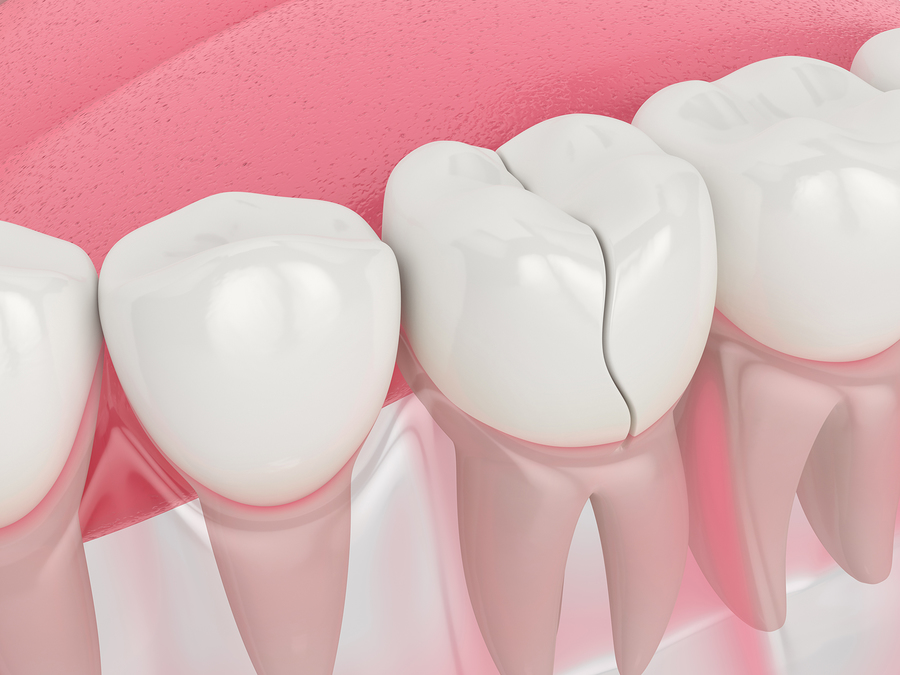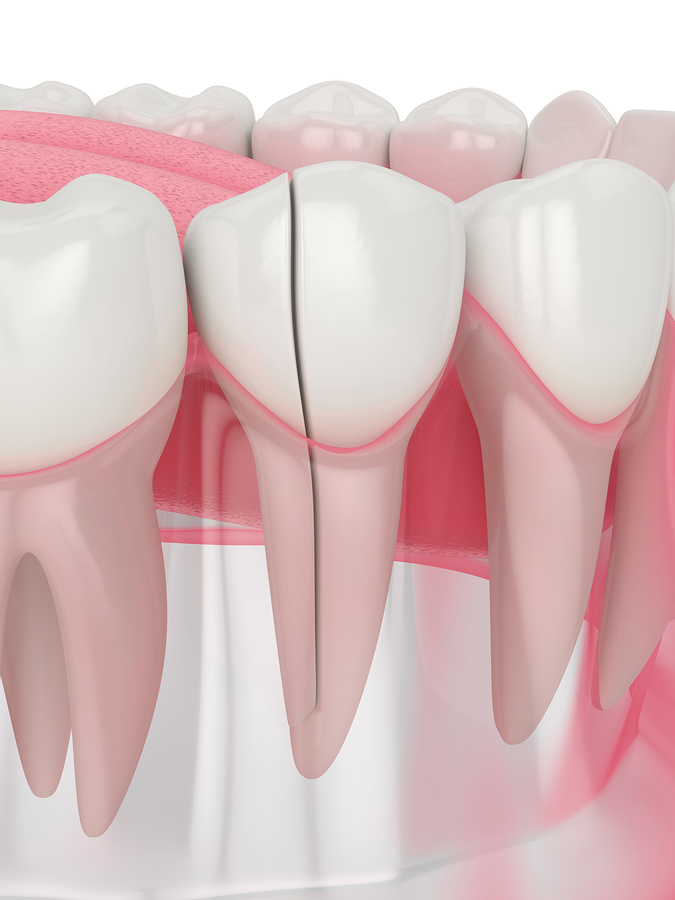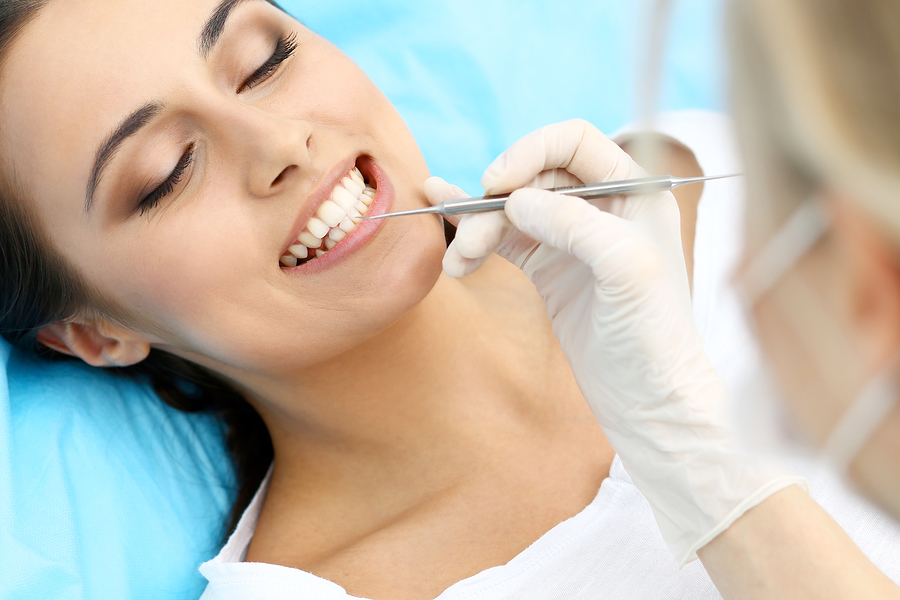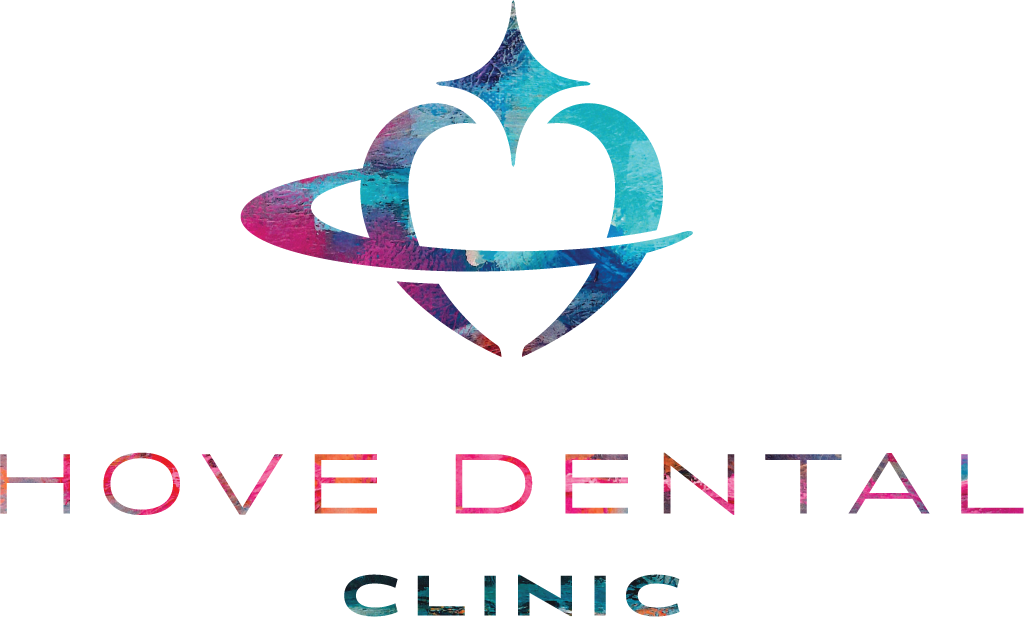Cracked teeth are not uncommon and in most cases, dentists can salvage your natural tooth if the problem is caught and treated early. At Hove Dental Clinic, we specialise in repairing damaged teeth and providing patients with a fully comprehensive dental service. We even specialise in treating nervous patients, so you can rest assured you’re in good hands with Hove Dental Clinic.
Below, you will find all relevant information on cracked teeth, including how to treat them, how to identify them, what to do when you can’t visit the dentist, and what to expect after we have repaired your tooth.
How We Treat Cracked Teeth

Our skilled team will start with a thorough examination, often using advanced imaging to assess the crack’s depth and impact. Depending on the severity, treatment options may include dental bonding for minor cracks, or a more robust solution like a crown or filling for significant damage. If the crack has affected the tooth’s pulp, a root canal might be necessary.
Our goal is to restore the tooth’s function and appearance while ensuring your comfort and long-term oral health. If the crack is very minor, not affecting the teeth overall and not causing discomfort, then we may decide to leave it.
Treatment for a Cracked Molar
Suspected cracks in molars must be seen by a dentist. When left, major cracks in molars will allow bacteria to enter the site and this can lead to infection and in worst cases, loss of the tooth.
Cracked molars differ in severity. For example, if the crack has simply chipped the top of the tooth, a filling or crown should suffice. However, if the crack has breached the gumline or root, it will require a root canal to remove the damaged tissue.
What is a Root Canal?
A root canal is a routine procedure that involves drilling into the affected tooth and removing the pulp, draining the abscess in the process. The pulp is the soft inner part of your tooth and is made up of living blood vessels, tissue, and nerves. When a crack reaches this area and becomes damaged, a root canal is required to repair the damaged tissue.
Your dentist will fill the pulp and root canals and then cap the affected tooth with a crown to strengthen it and allow you to eat and drink normally. Visit our dental abscess and root canal article to learn more about this.
Why Root Canal Treatments are Used for Repairing Cracked Teeth
While root canal treatments are typically seen as an intense treatment, it’s recommended as it may be able to save your tooth (which is better than opting for a crown or veneer to replace it). If the crack is severe and the tooth cannot be saved, then removal is the only option.
Be sure to look after your teeth, not just by brushing and flossing but by watching what you eat. Hard foods and bad habits such as teeth grinding and chewing on ice can further damage your teeth and result in cracks.
Eating With Your Restored Tooth
With both cracked and chipped teeth, it’s important to always remain cautious regarding eating and drinking. While our implants, crowns and bonds are designed to withstand extreme amounts of pressure, no man-made dental material will be as strong as your natural teeth. All restorations performed at Hove Dental Clinic are designed to perfectly mimic the appearance of your natural teeth, so you can rest assured that you will be smiling again in no time.

What Causes a Cracked Tooth?
There are many reasons why teeth crack and it’s important that you understand the reasons in order to minimise the risk of damaging your teeth. The most common reasons are:
Teeth crack because of a variety of issues, including:
- Teeth grinding (bruxism) – more about this later
- Poorly fitted fillings
- Eating hard foods, such as ice, nuts or hard confectionary
- Accident or injury – trauma to the tooth can cause it to shatter, break or come loose
- Fillings so large they weaken the integrity of the tooth
- Age – as we age, our teeth become more susceptible to damage
Now that we understand the main reasons why our teeth become cracked, we will move on to talk about how cracked teeth can appear.
Types of Cracked Teeth

Cracks can appear as:
Hairline cracks – as their name suggests, these cracks are very small and may not even be noticeable at first glance. The cracks breach the enamel and are painless. In most cases, hairline cracks (or craze lines as they’re also known) do not require any treatment. It’s good practice to visit your dentist to ensure it is a hairline crack.
Fractured cusps – this type of crack is typically found around a dental filling and in most cases, is nothing to worry about. Fractured cusps are usually horizontal and affect double-crowned teeth. They cause little to no pain and do not pose an immediate risk to your oral health, but it is advised you book an appointment with your dentist for further assessment.
Gumline cracks – if you damage your tooth or teeth to the extent where the crack reaches the gum line, it may still be salvageable. However, if your dentist discovers that the crack has reached into the gum line, it may have to be removed. The quicker this is identified and reported to a dentist, the bigger the chance they will be able to save the tooth.
Split teeth – arguably the most severe type of cracked tooth, a split tooth begins at the top of the tooth and travels down into the gumline. This is a very serious crack and in most cases, the tooth is not able to be saved. It will require removal and replacement with a veneer. For more information on this procedure, see everything you need to know about tooth implants.
Vertical root fractures – unlike a split tooth, this crack begins within the gumline and extends up into the tooth. This is a dangerous crack as it rarely shows symptoms and can become infected without you knowing. This is why it’s important to attend regular dental check-ups (once every six months) if you’re lucky, this can be spotted during a routine check-up and your tooth might be salvageable.
Decay-induced break – this type of crack is the result of tooth decay not being treated. When this happens, your tooth becomes weak due to the cavity decaying your tooth from the inside out. In the majority of cases, tooth decay will not result in the removal of the tooth. However, if the decay has been there for a prolonged period of time and has breached the bone, tooth removal may be the only option.

Minor Cracks in the Tooth
Minor cracks in the tooth may not require treatment, as they only affect the enamel (the outer layer of the tooth). Although they are still cracks, they are common and for the most part harmless in adult teeth.
It’s still strongly advised that if you do think you have cracked your tooth or have a hairline/craze line crack, you visit your dentist to have it checked. A professional can help you be sure the crack isn’t harmful and isn’t causing you any discomfort.
The Difference Between a Cracked Tooth and a Chipped Tooth

Cracked teeth and chipped teeth are often confused, but there are differences that are important to understand in order to effectively treat the problem.
Cracked Teeth
In most cases, patients will crack their molars; teeth at the back of their mouths are more susceptible to cracking. This is because this is where the majority of chewing is performed. Cracked teeth are more serious than chipped teeth as they require more labour-intensive treatments (in severe cases, a root canal may be required – more on this later).
We have ordered the treatments for cracked teeth from routine to severe to offer patients an idea of the different scales of treatment:
Routine – the cracked tooth only requires a small filling or dental crown to fix and restore the damage.
Severe – the crack has breached deeper into the tooth and will likely require a root canal. After this has been completed, a crown is required to protect the tooth, allow you to eat and drink properly and it is designed to mimic the appearance of your natural tooth.
Extremely severe – the crack has breached deep into the tooth and requires removal (known as a tooth extraction). When we remove your tooth, we will attempt to retain your natural neighbouring teeth and repair all damage. Fortunately, we are able to provide exceptional dental implants that mimic the natural appearance of your teeth and provide a long-lasting tooth solution.
Chipped Teeth
Chipping your teeth is very common and in most cases, not severe. People often chip their front teeth through accidents/trauma or biting down on hard foods. Most patients are more concerned about the appearance of their chipped teeth than the actual damage caused (which is quite minor most of the time).
Fortunately, chipped teeth are typically fast and simple procedures that can be fixed on the day of treatment. This is done by cleaning the affected tooth and surrounding area and then bonding a tooth-coloured filling to the chipped area. We may be able to reattach the part of your tooth you chipped if you’re able to bring it with you.
What are the Symptoms of Cracked Teeth?
Unfortunately, most symptoms of cracked teeth are difficult to spot, especially if there has been no physical trauma applied to the tooth. As mentioned previously, teeth can crack due to several reasons, and the cracks may not be obvious on the first inspection, for example, extreme temperature changes within the mouth may cause a crack in your tooth. Similarly, eating and drinking sugary foods and drinks may also cause the affected tooth to become sensitive and painful. Swelling of the gums is also a common side effect of cracked teeth.
If you have experienced trauma to the tooth and it’s clear it has cracked, try and find the broken piece so that your dentist may be able to bond it back onto your tooth.
Home Remedies Before You Visit Your Dentist
If you are not able to visit your dentist immediately and you are looking for ways to alleviate the pain and reduce the risk of infection, there are some home remedies you can follow:
- Rinsing your mouth with warm water/saltwater
- Taking pain medication – medications to treat headaches are commonly used to treat tooth pain. Consult your dentist for more information.
- If your tooth is bleeding, gently press a warm gause on the affected area to stop the bleeding.
- Apply a cold ice pack wrapped in a tea towel (or something similar) to your mouth (on the side of the affected tooth) to help reduce swelling.
- If the problem is severe and you are unable to see your dentist, visit a pharmacy and purchase some dental cement. Apply this on the affected tooth area for a temporary solution.
Frequently Asked Questions About Cracked Teeth
How much does it cost to fix a cracked tooth?
Composite restorations are the ideal solution for repairing cracked or chipped teeth. They are designed to match the exact tooth colour to give you back your most natural smile. Prices for restorations start at £220.
What can be done for a cracked tooth?
There are a few viable options for repairing a cracked tooth, as it is a common problem dentists face. In most cases, chipped teeth can be repaired by either reattaching the broken piece back to the tooth or by bonding a new, artificial crown or filling. The faster this is done, the more likely you will be able to salvage your tooth.
Can a cracked tooth heal on its own?
No, a cracked tooth will not heal on its own. It will require filling, via a crown or a veneer, and although this method strengthens the tooth and protects it from infection, your natural tooth will not heal further. This is why it is so important to seek treatment soon after you notice the crack.
Is a cracked tooth an emergency?
In most cases, a cracked tooth is seen as an emergency. This is because while a cracked tooth may not initially hurt or look too severe, the hole can grow over time if it is not treated. When this happens, more and more bacteria enter the affected area, which can cause infection and in extreme circumstances, loss of the tooth. For this reason, a cracked tooth can be considered an emergency.
What happens if a tooth cracks?
Tooth cracks are not uncommon and require routine treatment in order to restore them to their former appearance and health. However, when left, a cracked tooth can become infected, especially as more and more food/bacteria enter the crack. When this happens, an infection begins, which in severe cases can destroy the pulp and lead to you needing tooth removal. This is both costly and can be a complex procedure.

Don’t Neglect a Broken Tooth – Contact Us Today
For expert dental treatment from dentists who specialise in nervous patients, speak to our friendly team at Hove Dental Clinic today. We can restore your chipped or cracked tooth on the same day, allowing you to smile with confidence as soon as you leave our clinic. Once you have undergone treatment, we will also provide aftercare advice and tips to help you eat and drink safely while your tooth bonds to its new filling or crown.




















